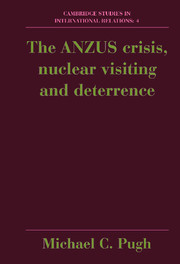Book contents
- Frontmatter
- Contents
- List of tables
- Preface
- List of abbreviations
- 1 INTRODUCTION: THE REVOLT OF AN UNDERLING
- 2 THE ANZUS TREATY AND STRATEGIC DEVELOPMENTS
- 3 DEFENCE CO-OPERATION AND NUCLEAR CONNECTIONS
- 4 WARSHIP ACCESS AND THE ANZAC LIABILITY SUSPENSIONS
- 5 NUCLEAR HAZARDS AND ENVIRONMENTAL SAFETY: ISSUES OF THE 1980S
- 6 ANTI-NUCLEAR POLITICS
- 7 FROM NEGOTIATION TO LEGISLATION
- 8 REGIONAL SECURITY AND THE FUTURE OF ANZUS
- 9 THE ANZUS CRISIS, NUCLEAR VISITING AND THE WESTERN ALLIANCE
- APPENDICES
- Notes
- Bibliography
- Index
7 - FROM NEGOTIATION TO LEGISLATION
Published online by Cambridge University Press: 06 July 2010
- Frontmatter
- Contents
- List of tables
- Preface
- List of abbreviations
- 1 INTRODUCTION: THE REVOLT OF AN UNDERLING
- 2 THE ANZUS TREATY AND STRATEGIC DEVELOPMENTS
- 3 DEFENCE CO-OPERATION AND NUCLEAR CONNECTIONS
- 4 WARSHIP ACCESS AND THE ANZAC LIABILITY SUSPENSIONS
- 5 NUCLEAR HAZARDS AND ENVIRONMENTAL SAFETY: ISSUES OF THE 1980S
- 6 ANTI-NUCLEAR POLITICS
- 7 FROM NEGOTIATION TO LEGISLATION
- 8 REGIONAL SECURITY AND THE FUTURE OF ANZUS
- 9 THE ANZUS CRISIS, NUCLEAR VISITING AND THE WESTERN ALLIANCE
- APPENDICES
- Notes
- Bibliography
- Index
Summary
Responding to New Zealand's refusal to accept the USS Buchanan, Admiral William Crowe announced that ‘New Zealand had increased the risk of nuclear war’. US reprisals for this indiscretion did little obvious harm to New Zealand but gave an appearance of outrageous coercion. Although domestic imperatives and divergent security perceptions were already creating difficulties in the ANZUS alliance, the occasion of New Zealand's bid for nuclear disengagement, and the American reaction, blighted the prospects for any diplomatic compromise. This chapter deals with the crisis over the USS Buchanan, the US responses and the problems of Australian and British mediation. It suggests that the Labour Government attempted to steer between the Scylla of domestic pressure and the Charybdis of the Reagan Administration's nuclearism. Once it was clear that the US would not renegotiate the New Zealand corner of the ANZUS triangle, the Labour Cabinet attempted to permit a tactful warship visit. When this failed it explored ways of satisfying the US and British non-disclosure policy and adopted a minimalist stance in legislating a nuclear-free zone.
In defending American interests the Reagan Administration identified the health of the alliance with New Zealand accepting a nuclear-capable ship. The Administration's hidden agenda was to dissuade other states from redefining their alliance relationship in similar fashion. In particular, the Australian facilities were thought to be at risk. The Australian Government, itself, faced domestic embarrassment as a result of New Zealand's nuclear ban.
- Type
- Chapter
- Information
- The ANZUS Crisis, Nuclear Visiting and Deterrence , pp. 126 - 149Publisher: Cambridge University PressPrint publication year: 1989
- 2
- Cited by



